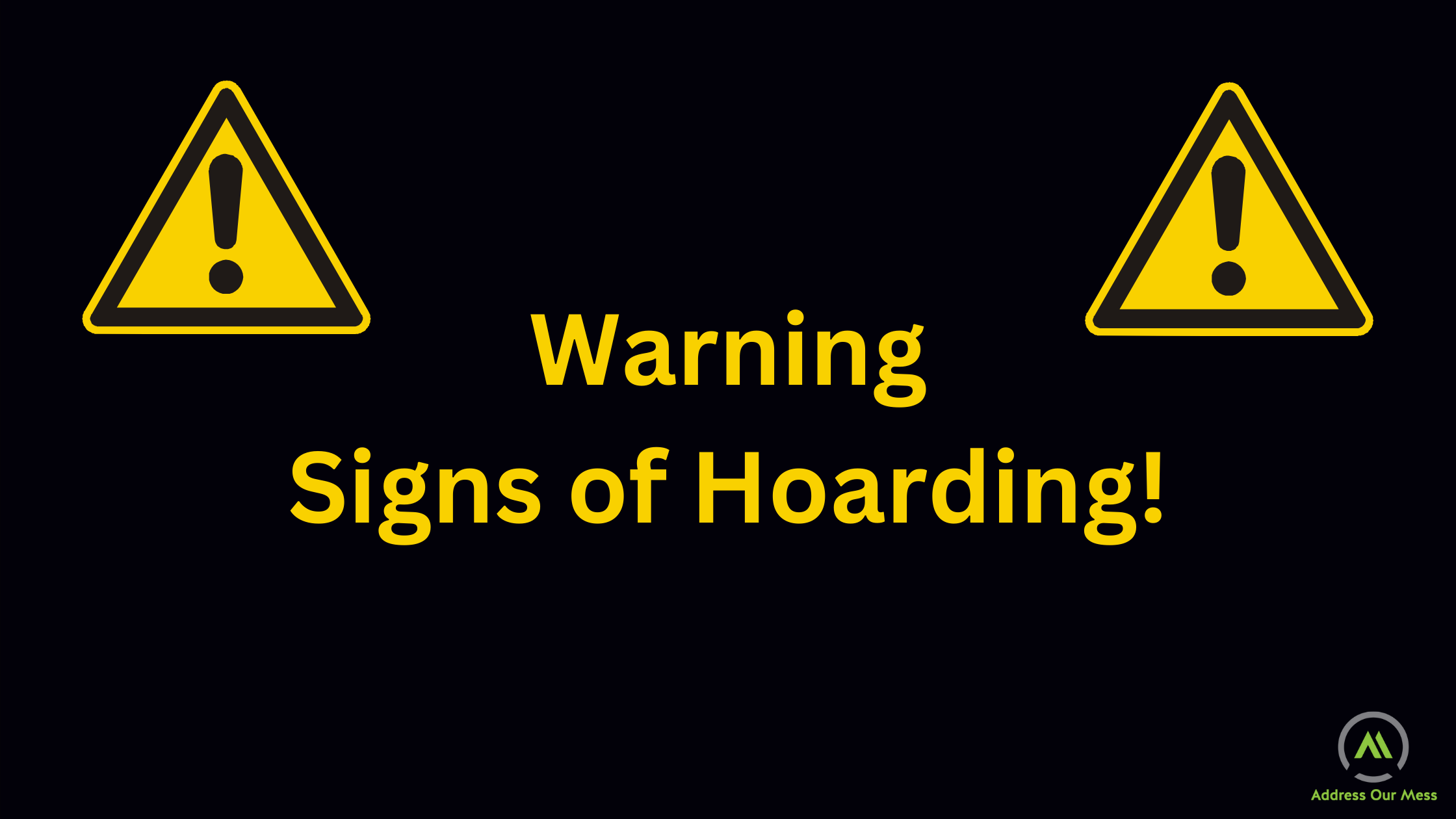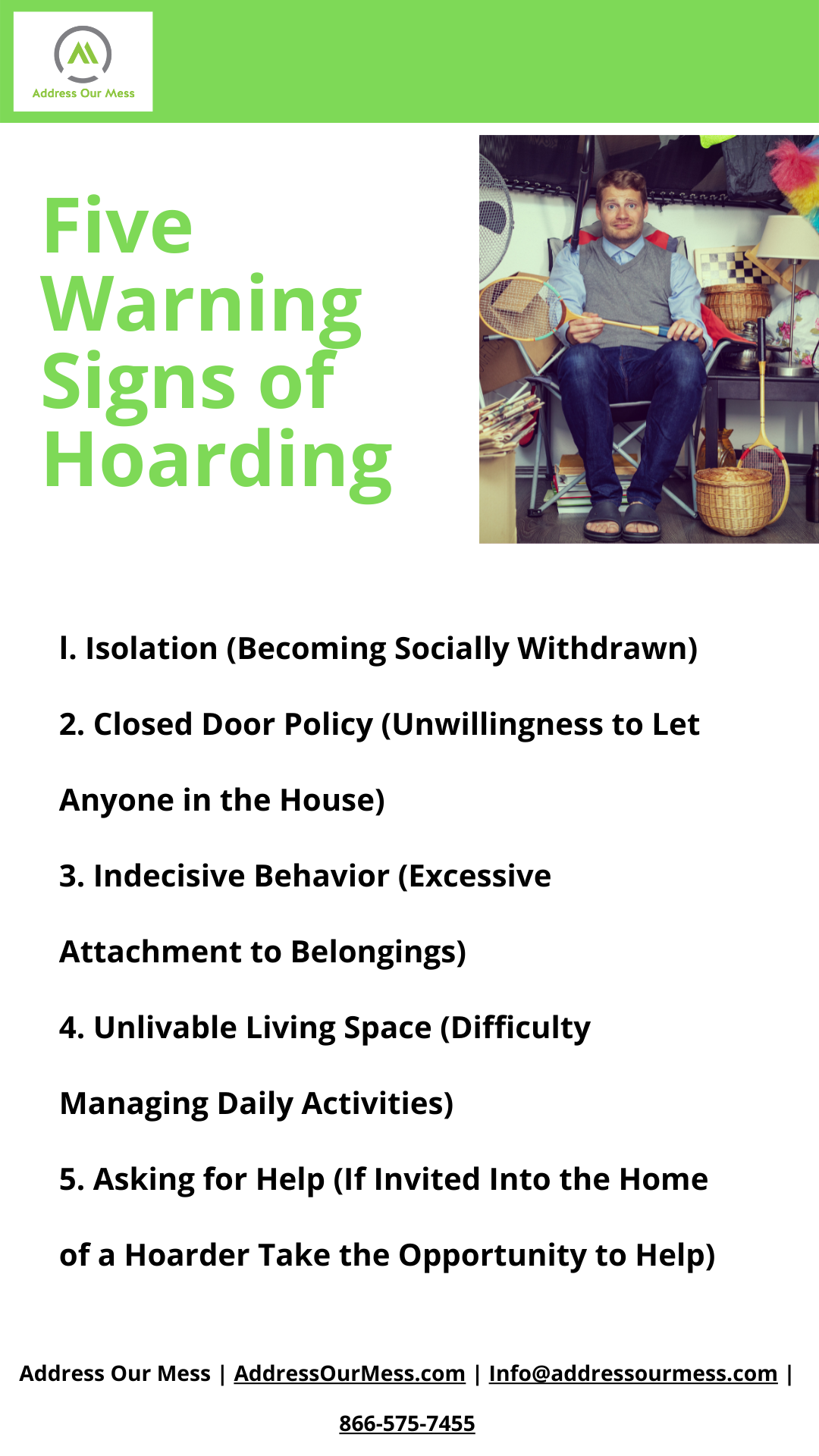How can you tell if someone you know or love, or if even you yourself, suffer from hoarding?
Hoarding occurs when a person’s unwillingness to let go of objects causes their belongings to pile up and fill their home. Hoarding can impede someone’s quality of life and cause stress, anxiety, depression, and even potential health risks. It can be hard to know if your loved one is hoarding because it is a private condition that can make people hide their lifestyle, to avoid change, which can be tough.
Below is a guide to assist hoarders and their helpers alike to identify key indicators of whether someone is hoarding or not.
As hoarding cleanup experts at Address Our Mess, we have made our, "Five Early Warning Signs of Hoarding” Guide available below.
"Five Warning Signs of Hoarding” Guide:
1. Isolation (Becoming Socially Withdrawn)
2. Closed Door Policy (Unwillingness to Let Anyone in the House)
3. Indecisive Behavior (Excessive Attachment to Belongings)
4. Unlivable Living Space (Difficulty Managing Daily Activities)
5. Asking for Help (If Invited Into the Home of a Hoarder Take the Opportunity to Help)
"Five Early Warning Signs of Hoarding” (Explained):
1. Isolation (Becoming Socially Withdrawn)
Withdrawing from social interaction to avoid judgement or embarrassment is common for hoarders. Hoarding becomes a coping mechanism, and they can become increasingly comfortable staying at home with their belongings instead of seeking healthy social interaction.
Hoarders will usually distance themselves from others as often as possible. Everyday tasks like going to work, grocery shopping, and attending special events will seem more obligatory than enjoyable. An illusion of basic interaction can be maintained by taking part in daily activities. However, when the routine is over, a hoarder will simply retreat to their unlivable home.
2. Closed Door Policy (Unwillingness to Let Anyone in the House)
A hoarder will often avoid letting anyone into their home to hide their lifestyle.
This is the biggest red flag for potential hoarding, A hoarder will regularly avoid meeting with anyone at their home, they will also never invite anyone over for a visit or party. If there are persistent excuses for why no one can come visit the home, there may be potential cause for concern. Some hoarders will even strongly decline a request to visitors seeking to enter their living space. Helpers of hoarders should never force themselves into a hoarder’s home. However, expressing the severe dangers of living in such conditions may be key to unlocking the opportunity to help a hoarder find their way on the road to recovery.
3. Indecisive Behavior (Excessive Attachment to Belongings)
Hoarding conditions develop when the ability to decipher which physical items hold value and which do not, fails. Every person has a unique reason as to why emotional connections are made with material objects but for hoarders the emotional connections become irrational. The irrational and usually excessive number of items ends up negatively affecting the life of the hoarder and possibly their loved ones.
A hoarder’s attachment to objects goes beyond what is usual, they can become emotionally invested in objects that have no real value. If you notice your loved one discussing or treating everyday objects with affection to the point where it is impossible for them to through away objects that are negatively affecting their life, they may be hoarding.
4. Unlivable Living Space (Difficulty Managing Daily Activities)
Hoarders make their home unlivable by bringing to many items into their home while not being able to throw away items. Many times, hoarding conditions are accompanied by the hoarder frequently buying large quantities of items, which is a sign of hoarding.
A person’s living condition is not all that is affected by chronic indecisive behavior that leads to hoarding. Careers can be ruined, savings can be squandered, and simple functionality like shopping and driving can be affected so much so that a person’s quality of life is hindered and diminished. Calling on a hoarding cleaning service provider is the first step to ensuring that the condition does not get out of hand.
Hoarders psychologically have a different decision-making process. Making decisions is difficult because every choice comes with the loss of what they didn’t choose. To avoid making decisions, hoarders will often excessively procrastinate, or become consumed with one task that distracts them from all regular daily activities.
5. Asking for Help (If Invited Into the Home of a Hoarder Take the Opportunity to Help)
Being let into the world of a hoarder can be shocking and overwhelming. However, being invited into the home translates into being called upon for help, it is a cry for help. Hoarders will allow everyday living areas to completely lose their functionality. Food is no longer prepared, cooked, or even stored in the kitchen. Bedrooms are no longer slept in, living rooms are no longer lived in, and bathrooms no longer function the way they are meant too.
Take this opportunity to strengthen the bond of trust that is vital to the success of hoarding recovery. With the meteoric rise in hoarding cases across the US and in the mainstream media, it would be very easy to confuse someone’s call for help with a desperate attempt at attracting attention. If a hoarder is asking for help or for someone to confide in, the opportunity must be seized immediately to effectively start the hoarding recovery process. Hoarding conditions can range from small amounts of clutter to massive hordes of garbage, animals, and biohazards. Use the opportunity wisely and gain the trust of your friend or loved one who is asking for your help.
If you see a concerning combination of some or even all the above signs, there is a chance your loved one is hoarding. It is important to get them to accept both psychological and physical cleanup help. You can find a licensed therapist in your area at iocdf.org and Address Our Mess can handle all physical cleanup needs. We sort and organize belongings, handle donated items, and trash haul, and deep clean the home to return it to a livable condition.
This comprehensive visual guide was built to assist hoarders and their helpers alike in identifying some of the key clues in determining whether hoarding has overtaken someone’s life or not. This guide can be used in conjunction with other guides such as our Official Do’s and Don’ts Guide for Hoarders and Decluttering Tips, to help hoarders and their helpers better understand the challenges and the desires of one another.
Please consider our company Address Our Mess for professional hoarding cleanup service. Call 410-589-2747, email info@addressourmess.com, or use our contact us page for more information. We are here to help! Address Our Mess project managers and technicians specialize in assisting hoarders with creating a happier and healthier living environment.
For more answers to your Hoarding FAQs please visit our Hoarding Blog.

